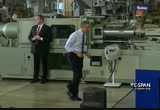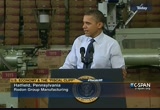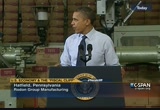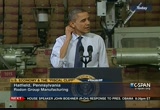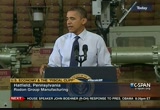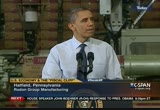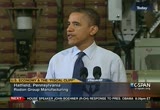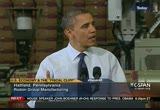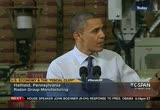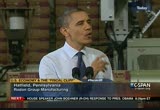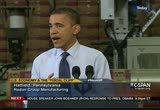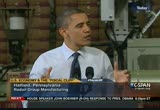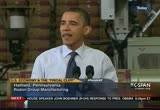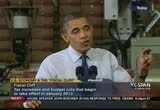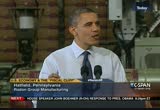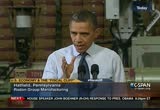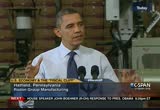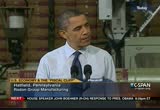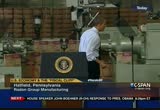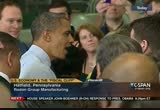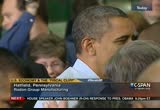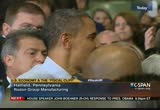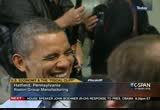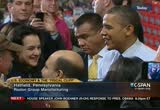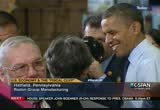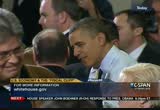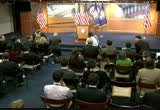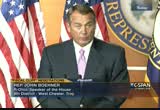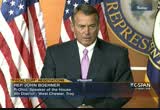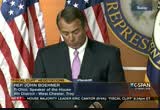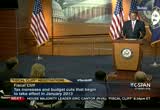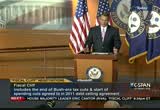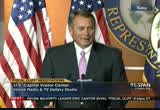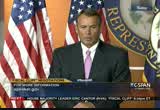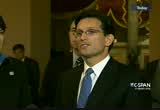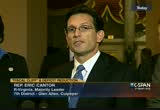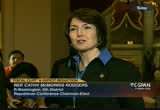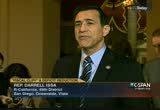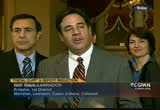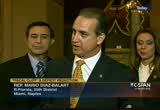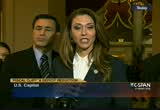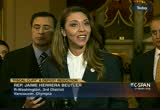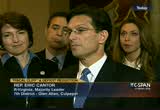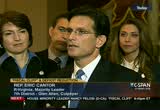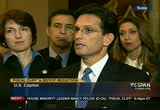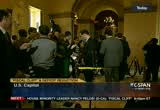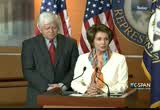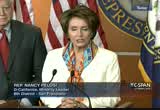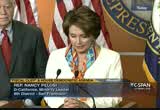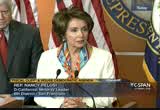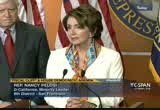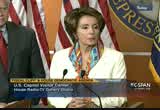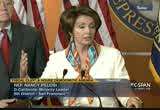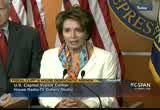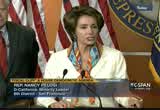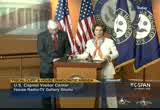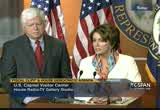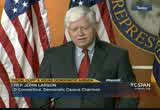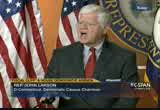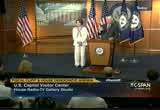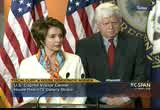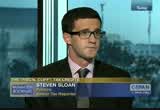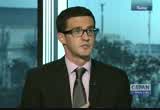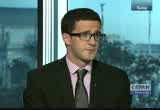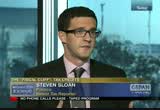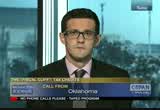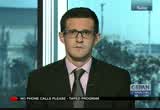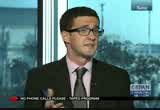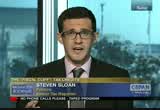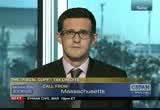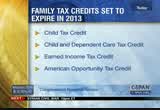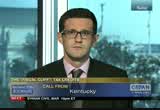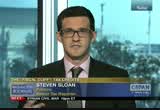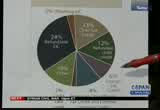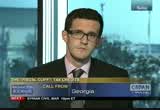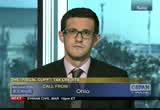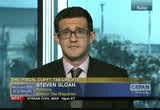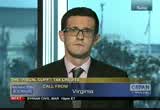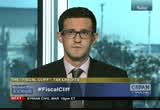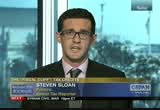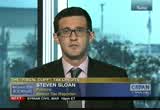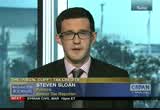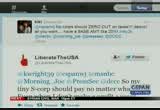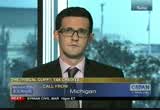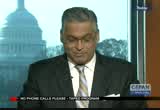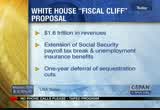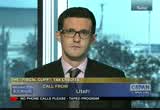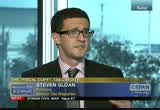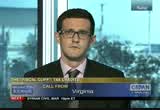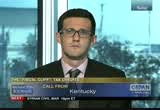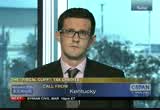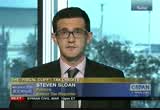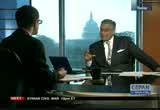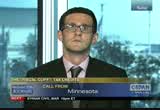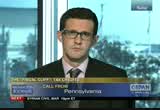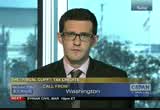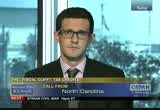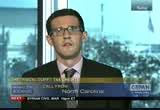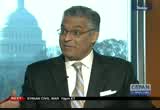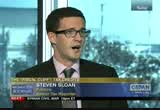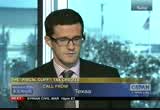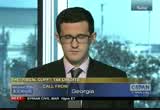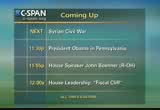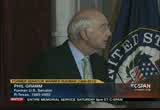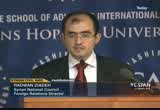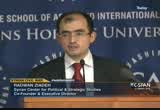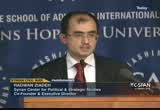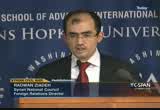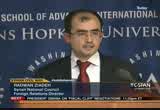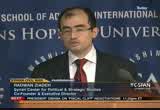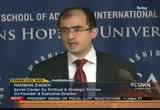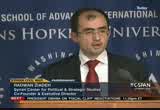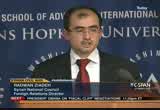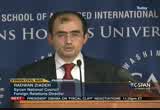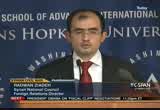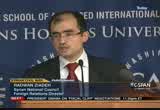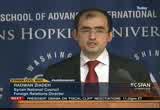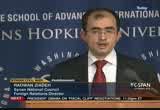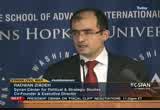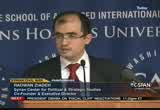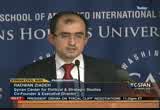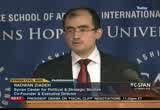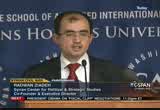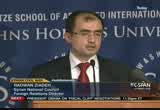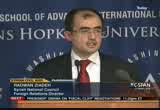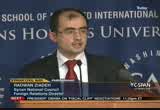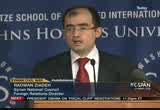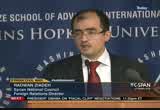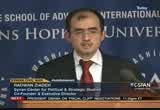tv Politics Public Policy Today CSPAN November 30, 2012 8:00pm-10:30pm EST
8:00 pm
on being an adult with autism and the federal role in supporting autistic adults and children plus, your emails, phone calls, and tweets. "washington journal," live saturday at 7:00 a.m. eastern on c-span. tonight, and look at the white house and congress and how they are addressing the so-called fiscal cliff. first, president obama speaks in pennsylvania, followed by john boehner responded to the president from capitol hill. then eric cantor response of the lighthouse deficit reduction package. later, nancy pelosi addresses the fiscal cliff and middle- class tax cuts. president obama talked about the so-called fiscal cliff and his proposal to end of the bush tax
8:01 pm
cuts on those earning more than two and a $50,000. ed -- more than $250,000. ["hail to the chief" plays] please have a seat. have a seat. relax for a second. it is good to see all of you. hello. it is good to be back in pennsylvania. it is good to be right here. i want to thank michael, robert, and the investor, joel glickman for hosting me today and giving me a great tour.
8:02 pm
stand up so everybody can see you, guys. [cheers and applause] there you go. we have a couple of outstanding members of congress here. [cheers and applause] now, i just finished getting a tour of the workshop. i have to say it makes me wish that joel invented this stuff sooner when i was a kid. back then, you couldn't build a roller coaster out of your erector set. i got a chance to meet some of the folks who have been working around the clock to keep up with the christmas rush. that is a good thing. these guys are santa's extra elves. they manufacture almost 3000 pieces every minute. every box that ends up on store shelves in 30 countries is stamped "made in america." that is something to be proud
8:03 pm
of. [cheers and applause] by the way, i hope the camera folks have a chance to take a look at some of it. including that flag. joe biden was in costco and he wanted to buy some of this stuff. [laughter] i told him he had too much work to do. i was not going to have him building roller coasters all day long. of course, santa delivers everywhere. i have been keeping my own list for washington. you should keep your eye on who gets some this year. there are going to be some members of congress who get them and some who don't. [applause]
8:04 pm
this is a wonderful time of year. it has been a few weeks since a long election finally came to an end. obviously, i cannot be more honored to be back in the white house. but i am already missing the time that i spent on the campaign visiting towns like this and talking to folks like you. >> we love you. >> i love you back. [applause] one of the benefits of traveling and getting out of the white house is it gives you a chance to talk to the american people about what kind of country we want to be and what kind of country we want to leave to our kids. i believe america only thrives when we have a strong middle class. i believe we are at our best when everybody gets a chance to get ahead. we were talking about these
8:05 pm
guys' dads. just passed away at the age of 101. these guys have good genes in addition to inventive minds. the stories about businesses, hiring folks, making sure you can get ahead, that is what america is all about. that is at the heart of the plan that i have been talking about all year. i want to reward manufacturers and small businesses that createnot overseas. [applause] by the way, this is a company, one of the few companies in the toy industry, that aggressively moved jobs back here. that is a great story to tell. [applause]
8:06 pm
because we have the best workers in the world. and the most productive workers in the world. we need champions for american industry creating jobs here in the united states. i want to give more americans the chance to learn the skills that businesses are looking for right now, and i want to give our children the kind of education they need. i want to lead the world in research, technology, and clean energy. i want to put people back to work rebuilding our roads, bridges, and our schools. i want to do this by bringing
8:07 pm
down our deficits in a balanced and responsible way. [applause] we have important decisions to make. our ultimate goal is to get our long-term deficits under control in a way that is balanced and fair, and that will be good for businesses, for future generations. i believe both parties can and will work together in the coming weeks to get that done. we know how that gets done. we will have to raise more revenue, cut out spending we do not need, building on the spending cuts we have already made, and if we combine those two things, which can create a path where america is paying its bills while being able to make investments in things we need to
8:08 pm
do like grow infrastructure. we know how to do it, but in washington nothing is easy, so there is kind to be some prolonged negotiations. all of us will have to get out of our company's films to make that happen. i am willing to do that and am hopeful that enough members of congress in both parties are willing to do that as well. we can solve these problems. but where the clock is really ticking right now, is on middle- class taxes. at the end of the year, middle class taxes that are currently in place are set to expire. middle-class tax cuts are set to expire. there are two things that can happen. if congress does nothing, every family in america will see their income taxes automatically the up on january 1.
8:09 pm
every from -- every family will see their taxes go up on january 1. i assume that does not sound too good to you. that is like dell lump of coal you would get for christmas. a typical middle class family of four would see their income taxes go up by about $2,200. that's for a typical family. it would be more for some folks. that's money a lot of families just can't afford to lose. that's less money to buy gas, less money to buy groceries. in some cases, it means tougher choices between paying the rent and saving for college. it means less money to buy more kinex. just the other day, economists said if income taxes go up on the middle class, people will
8:10 pm
spend nearly 200 billion less in scores and on line. -- in stores and online. and when folks are buying fewer not good for our businesses. it's not good for our economy. it's not good for employment. that's one path. congress does nothing, we don't deal with this looming tax hike on middle class families, and gets hit with this big tax hike and businesses suddenly see fewer customers, less demand, the economy, which we've been fighting for four years to get out of this, you know, incredible economic crisis that we have, it starts stalling again. so that's one path. the good news is there's a second option. right now congress can pass a law that would prevent a tax hike on the first $250,000 of everybody's income. everybody. so that means 98% of americans,
8:11 pm
97% of small businesses wouldn't see their income taxes go up by a single dime, right? because 98% of americans make $250,000 a year or less. 97% of small businesses make $250,000 a year or less. so if you say income taxes don't go up, income above $250,000, the vast majority of americans, they don't see a tax hike. but here's the thing, even the top 2%, even folks who make more than $250,000, they still keep their tax cut on the first $250,000 of income. so it would still be better off for them, too, for us to go ahead and get that done. families would have a sense of security going into the new year. companies like this one would know what to expect in terms of planning for next year and the year after. that means people's jobs would be secure.
8:12 pm
the sooner congress gets this done, the sooner our economy will get a boost. and it would then give us in washington more time to work together on that long range plan to bring down deficits in a balanced way. tax reform, working on entitlements, and asking the wealthiest americans to pay a little bit more so we can keep investing in things like education and research that make us strong. all right? so those are the choices that we have. and understand this was a central question in the election, maybe the central question in the election. you remember. we talked about this a lot. [laughter] it wasn't like this should come to anybody's -- as a surprise to anybody. we had debates about it. there were a lot of tv commercials about it. and at the end of the day, a clear majority of americans, democrats, republicans, independents, they agreed with a
8:13 pm
balanced approach to deficit reduction and making sure that middle class taxes don't go up. folks agreed to that. now, the good news is we're starting to see a few republicans coming around to it, too. i'm talking about republicans in congress. so the reason i'm here is because i want the american people to urge congress soon, in the next week, the next two weeks, to begin the work we have by doing what we all agree on. both parties agree that we should extend the middle class tax cuts. we've got some disagreements about the high-end tax cuts, right? republicans don't want to raise taxes on folks like me. i think i can pay a little bit more to make sure that kids can go to college and we can build roads and invest in n.i.h. so that we're finding cures for alzheimer's. and that's a disagreement that we're going to have and we got
8:14 pm
to sort out. we say we want to make sure middle class taxes don't go up. so let's get that done. let's go ahead and take the fear out for the vast majority of american families so they don't have to worry about $2,000 coming out of their pockets starting next year. the senate has already passed a bill to keep income taxes from going up on middle class families. that's already passed the senate. your members of congress, like alison and other democrats in the house, they're ready to go. they're ready to vote on that same thing. and if we can just get a few house republicans onboard, we can pass the bill in the house. it will land on my desk, and i am ready. i've got a bunch of pens ready to sign this bill. i'm ready to sign. [applause] >> ready to sign it.
8:15 pm
there are no shortage of pens in the white house. and i carry one around for an emergency, just in case. just waiting for the chance to use it to sign this bill to make sure people's taxes don't go up. well, don't thank me yet because i haven't signed it. i need -- i need some help from congress. so the key is though, the american people have to be involved. you know, it's not going to be enough for me to just do this on my own. so i'm hopeful that both sides are going to come together and do the right thing. but we all know you can't take anything for granted when it comes to washington. let's face it. and that's why i'm going to be asking for all of you to make your voices heard over the next few days and the next couple of weeks. i need you to remind members of congress, democrats and republicans, to not get bogged
8:16 pm
down in a bunch of partisan bickering, but let's go ahead and focus on the people who sent us to washington and make sure that we're doing the right thing by them. so i want you to call. i want you to send an email. post on their facebook wall. if you tweet, then use a hash tag we're calling my 2k. not y2k. my 2 k. because it's about your two k in your pocket. we're trying to burn that into people's minds. [applause] part. i'm meeting with every constituency group out there. we're talking to c.e.o.'s. we're talking to labor groups. we're talking to civic groups. i'm talking to, you know, media outlets, just explaining to the american people this is not that complicated. let's make sure that middle
8:17 pm
class taxes don't go up. let's get that done in the next couple of weeks. let's also work together on a fair and balanced, responsible plan so that we are paying our bills. you know, we're not spending on things we don't need, but we are still spending on the things that make us grow. that's the kind of fair, balanced, responsible plan that i talked about during the campaign, and that's what the majority of americans believe in. so, i'm hopeful, but i'm going to need folks like you and the in pennsylvania and all across the country to get this done. and a lot is riding on this debate. this is too important to our economy, it's too important for our families to not get it done. and it's not -- it's not acceptable to me, and i don't it's acceptable to you, for just a handful of republicans in congress to hold middle class they don't want tax rates onall right? that doesn't make sense.
8:18 pm
[applause] if your voices are heard, then we can help businesses like this one. we're going to sell a whole bunch. let's -- [applause] let's give families all across america the kind of security and certainty that they deserve during the holiday season. let's keep our economy on the right track. let's stand up for the american belief that each of us have our own dreams and aspirations, but we're also in this together. and we can work together in a responsible way. that we're one people. and we're one nation. that's what this country is about. that's what all of you deserve. that's what i'm fighting for every single day. and i will keep fighting for as long as i have the privilege of being your president. thank you very much, everybody. god bless you.
8:27 pm
held his own meeting on the fiscal cliff negotiations. this is close to 10 minutes. >> good afternoon, everyone. the president traveled to pennsylvania to visit a small business today to talk about the fiscal cliff. unfortunately, it's the president and members of his own party who were proposing that we let many small businesses, as in hundreds of thousands of them, go over the fiscal cliff. simply put, that's why we don't have an agreement as yet. they said yesterday this is not a game. i used to be a small business owner. small business owners are regular men and women from all backgrounds who, in today's economy, are facing challenges on a daily basis. and the president's tax increase
8:28 pm
would be another crippling blow for them while doing little to nothing to solve the bigger problem here, which is our national deficit and our national this debt doesn't exist because we don't tax small businesses enough. it exists because washington continues to spend too much. raising taxes on small businesses instead of taking a balanced approach that also cuts spending is wrong. it's only going to make it harder for our economy to grow. and if our economy doesn't grow, americans don't get new jobs. and the debt problem that we have will continue to threaten our children's future. as i said the day after the election, republicans are not the president. we're seeking a bipartisan solution that can pass both chambers of congress and be signed into law by the president in the coming days. now, during the campaign, the president pledged to the american people that he would seek a balanced approach to addressing the debt, a combination of new revenues and spending cuts. so the day after the election,
8:29 pm
i said the republican majority would accept new revenue as part of a balanced approach that includes real spending cuts and reforms. now, the white house took three weeks to respond with any kind of a proposal, and much to my disappointment, it wasn't a serious one. still, i'm willing to move forward in good faith. our original framework still stands. instead of raising tax rates, we can produce similar amount of revenue, reforming the tax code to close loopholes and lower tax rates. that's far better for the economy, and the american people actually favor that approach by two to one. they favor it even more when we can also show them that real spending cuts will, in fact, reduce the deficit. now, there have been many conversations over the last couple of years that could inform a solution.
8:30 pm
i hope the president will draw from those discussions and work with both parties to find common ground. solving the fiscal cliff in a manner that addresses the true drivers of our debt and saves american jobs is a great way for the president to start his second term. and for the good of our country, and my colleagues, we're ready to work with the president to achieve those goals. >> mr. speaker, couple things. first, on the issue of tax rates, are you willing to accept no deal that includes some increase in those top tax rates? and i'm also wondering what our final deadline is on this? when do we really have to have a deal? >> increasing tax rates draws money away from our economy that needs to be invested in our economy to put the american people back to work. it's the wrong approach. we're willing to put revenues on
8:31 pm
the table, but revenues that come from closing loopholes, getting rid of special interest deductions, and not raising rates. we think it's better for the economy. pure and simple. secondly, the american people expect us to find common ground, to work together, and to resolve this. and frankly, sooner is better than later. >> you've been doing this for a long time. the past 24 hours, is this the necessary public posturing that needs to go on or is there a serious stalemate right now? >> there's a stalemate. let's not kid ourselves. i'm not trying to make this more difficult. if you've watched me in the last three weeks, i've been very guarded because i don't want to make it harder for me or the president or members of both parties to be able to find
8:32 pm
common ground. but when -- when i come out the day after the election and make it clear that republicans will put revenue on the table, i took a great risk. and then the white house spends three weeks trying to develop a proposal, and they send one up here that calls for $1.6 trillion in new taxes, calls for a little -- not even $400 billion in cuts, and they want to have this extra spending that's actually greater than the amount they're willing to cut. i mean, it's -- it's -- it was not a serious proposal. and so right now we're almost nowhere. >> do you expect to speak to the president again? are there meetings scheduled between you and the president? >> a lot of ideas have been put on the table. we've had conversations, and i'm sure we'll continue to have conversations. >> do you think the white house is trying to squeeze you? and if so, will that work? >> listen, most of you know me
8:33 pm
pretty well. what you see is what you get. i may be affable, someone that can work with members of both parties, which i've demonstrated over the 22 years that i've been here. i've also rather determined to solve our spending problem. and to solve this looming debt crisis that is about to consume us. >> what is it that republicans want on reform? you keep saying the president needs to show the democrats' hand on this. what do you want to do in terms of medicare and how quickly do you want those implemented? >> well, you can look at our budget from the last two years, and there are plenty of specific proposals, most of which were part of the conversation that the president and i had two years ago. or a year and a half ago. there have been discussions about many of those same issues this time. so there's a lot from the conversations that we've had to inform almost anybody the kind of proposals we're
8:34 pm
looking for. >> even the paul ryan plan on medicare doesn't really take effect for years down the road. do you want something more immediate? >> i think the debt crisis that we face requires us to make serious decisions and it requires us to make those decisions now. thank you. >> eric cantor also talk about the deficit reduction package. if the make it easier for foreign students to stay in the us, the stem jobs that. this is about 10 minutes. >> good afternoon. we just passed the stem's job act. it was a build directly related to trying the economy going again. we know that america's strength
8:35 pm
os has and will be innovation. we have seen not only american students, but many foreign nationals have come to this country to be educated at our colleges and universities, specifically in the stem areas in the graduate education programs. the build that we passed will allow individuals to have a green card if they get a diploma. it will enable them to stay in this country to begin their careers and create jobs rather than being forced to leave to go back to their own countries and compete with us. this is an american job creation bill. it is something we strongly believe in. it reflects what all this believe about america. we are a country of unlimited opportunity. you want the world rosie best and brightest to come here. we also have a bill that allows for a family unification for
8:36 pm
spouses and children. if their spouse and or parent is in this country legally, instead of having to wait three years, milling have to wait one year so we can help families reunify and they can go about joining the foreign national students and graduates here as that individual goes about job creation and helping america continue to innovate. with that, i turn it over to the chairman, kathy rogers. >> thank you and thank you for your leadership on this issue. it's again, the house is taking the lead on legislation that will help create jobs for our economy. there are over 100 companies across the the nation that have signed and support this legislation and hundreds more will benefit. they recognize this is the way that we help to create jobs and
8:37 pm
encourage innovation for the economy. one of those companies is microsoft, located in washington state, that i happen to represent. when i talk to microsoft, they say, we need those employees that have the training and education of science technology, engineering, and math. this is what this legislation is about. we want america to be the magnet for the best minds. we want them to come here, get educated, and stay here to improve our lives and turn it into a reality right here in america so that america continues to be the land of opportunity for all. >> today we put another down payment on jobs and job creation. for each of these visas that are granted, it is estimated that there'll be three additional u.s. jobs created. for each of these individuals
8:38 pm
who apply, they will look at who the student population is in the united states working on masters and phd's and stem areas. this of be at a diverse population. this cause us to see this as an improvement in diversity outreach. almost anyone who attends a graduation at the masters and phd level, you will see those crossing the line coming from all over the world and in all colors and sizes. that is why we did this today. we want this to be one that says, who wants to come to be america and has a likelihood of success in creating success for all americans? >> today is an important day. it is the beginning of what we need to do for the next two years on immigration.
8:39 pm
he will work on bees as an jobs, but most importantly we will work on the angst that are important for america. i want to remind all of you that the democrats had two years to do something about immigration reform. they had the white house, the house, and the senate. they did nothing for immigration reform. today we started with one step and they opposed it. they post every time we got closer. they try to move the goalposts and the ball. they try to move it away from us. let's start working on real reform. i think we will be able to be successful. thank you. >> thank you. it makes no sense to educate people, bright and talented people, and deport them so they can compete against the united states.
8:40 pm
we are outsourcing talent and job creators, which makes no sense. this bill has very important components that deals with family unification. this does not solve everything. it is a great step in the right direction. it deals with an important aspect of destroyed and broken immigration system. his is an issue we have been talking about for years. -- this is an issue we have been talking about for years. thank you for your leadership in getting this done. it is a step in the right direction. i hope we have a lot more of these press conferences when we fit the immigration that does not work for our economic interest. his is a right step in the right direction on that part. thank you. >> one of the reasons i
8:41 pm
supported this bill is because i have had tech manufacturers, employers, job creators taking that they need more highly skilled workers. a great thing about this bill is that it is a safeguard. it gives opportunity for american workers to fill the slot. we hope that there are so many jobs, than those men and women who have come here from another country and have gone through university and gotten stem degrees, they have the opportunity to supply and help grow businesses and ideas. this is a great start. we can decrease foreign competition. it makes no sense to educate the world's best and brightest and require them to go home and br, tuition. -- and be our competition. we do not win that way.
8:42 pm
the way that we win is by keeping the best and the brightest here. this is a great step. this is the first piece of reforming immigration. it is the first piece -- immigration and economic opportunity in one step. it is a good idea. hopefully we will see it through to passage. thank you. >> what was your reaction to the president's offer? >> we has said that the offer is not a serious offer. all of a sudden we are asking for $1.6 trillion in tax hikes and we are nowhere near that number in spending reform. what we have always said is that if you want to fix a problem, we want to make sure that we get a handle on the obligations connected with entitlement programs.
8:43 pm
we want to stop the spending problem so that we can go about trying to manage the debt and the deficit. we do not want to aggravate a struggling economy. we want to get people back to work. we take the position that raising tax rates is absolutely not something that helps get people back to work. >> what was the importance of the visas rather than going ahead and -- >> what we believe is that this was the first step lowered in terms of trying to address the need for modernization and update the laws. we have a system of lottery that frankly i think is properly replaced with a system that rewards those who want to come here to help create jobs and help our economy back on track. it is in sync with our
8:44 pm
priorities of helping americans get back to work and create more jobs. >> the democrats had said after do response toward the white house's proposal that the ball is now in your court. is a ball and the republicans court now? >> we engage in discusses -- in discussions that are serious. what they gave us was not a serious proposal. we remain in discussion. i know the speaker and i do not want to see us go over the fiscal cliff. we have got to get serious. we do not want to increase tax rates. we want to do something about the spending problem. remember, the goodwill -- the speaker put revenue on the table just after the election.
8:45 pm
he said, we get it. the president won his reelection and we won our be election. here is our proposal to the president that we were unwilling to give during that negotiation talks last year. >> they know that you put revenue on the table. will you pull back from them and give them some spending cuts question mark -- cuts? >> this is not a game. we are not interested in playing rope a dope. we do not want to see taxes go up on anybody. we want to engage in tax reform and get the economy going. we are not playing a game. that offer yesterday was simply not serious. thank you.
8:46 pm
>> next, house minority leader nancy pelosi talks to reporters about the so-called the school cliff negotiations. she urged house republican leadership to bring legislation to the floor regarding middle- class tax cuts. this is about 20 minutes. >> good afternoon. i'm here today with my colleague. i invited him here to be with us this afternoon because yesterday i named tim to be the head of the leadership task force of election reform. i believe how we do our policy is directly related to -- it
8:47 pm
has a direct impact on the policies that we create in congress. our founders risked their lives and liberties and their sacred honor for a government of the many and not government of the money. john larson is up her fifth person -- perfect person in that regard. first, i want to talk about the subject at hand. the president has his pen in hand. he is ready to sign the middle class income tax. a similar bill was introduced into the house at that time. since then, we have been asking republican leadership to bring middle income tax cuts to the floor. the clock is ticking. it is important with tax legislation -- for the tax legislation to happen now.
8:48 pm
we are calling on the republican leadership in the house to bring this legislation to the floor next week. we believe that not doing that and holding the middle income tax cuts hostage for the tax cuts for the rich will heap mountains mountains of debt on future generations. to that end, if there is no announcement of scheduling of the middle income tax cuts -- which by the way, it has tremendous support and every pub can caucus -- i think we will get 100% vote if they came to the floor. if it is not scheduled, on tuesday we will be introducing a discharge petition. if we can get a certain number of signatures, it will ring the bill automatically to the floor. that would mean we would need some republicans to support
8:49 pm
middle income tax cuts to sign on with us. this is very important. so much has been said. this is only one piece of what we have to do before we leave for christmas, hanukkah, kwanzaa, every other holiday that is coming up. the other part of it of course is to avoid going over the cliff. you have heard much of what would happen if we do. let's dwell instead on what would happen if we do not go over it. there is so much evidence for the markets and the consumers. there is so much good. that is why we were leased to receive every poor yesterday about the president sticking with his big and bold, balanced approach. it said we have to create jobs and infrastructure, etc. we have to make cuts, but in
8:50 pm
order to get her from here in terms of you do facing -- in terms of reducing the deficit -- we call upon the republicans to come to the table to get this job done. we're are there to supply votes to pass this when they come to an agreement. first and foremost, we would hope that the speaker would say that we are scheduling a middle income tax cut next week. again, elections have consequences. the president campaigned. he made it very clear that he was supporting tax cuts for the middle class and that he wanted the expiration of the tax cuts for the high end.
8:51 pm
he let the people know that. they voted for him. even more so people support the subject. overwhelming support for the repeal of the higher tax cuts. any questions? >> madam leader, the response from the publicans today was instantaneous. mr. cantor just finished saying that they were not going to raise rates. what is your response to that? given that line in the sand, where does this process stand? >> let me say that there are three elements to this -- growth, reduction in spending, and raising revenue. we have voted for -- the democrats have voted for over $1 trillion in cuts and spending. that was part of the budget
8:52 pm
control act. that is part of how we should go forward. you cannot speak about reducing the deficit without talking about raising revenue. i think the president has taken his message to the american. i hope the republicans will listen to that. in the republican caucus -- i'm usually the last person to speak -- i know many members of them are ready to vote for middle income tax cuts. then mckinley the subject of rates and all the rest of that for next year -- and then we can be the subject of rates and all the rest of that for next year and whatever we would do under a broader tax reform package. have >> [inaudible] >> no.
8:53 pm
>> last year you raise idea of redefining wealth. making it when million dollars or more. >> just where that republicans would support an expiration of tax cuts. it was about finding out where the republicans were. at that point, they said no. if you make $1 million per year, we will not touch a hair on your head. they hold harmless the wealthiest people in that
8:54 pm
country, even making over $1 million per year. >> could you see yourself as a compromise supporting the idea of moving that? >> the president would forward a package that reduces the deficit that predicated the expiration of the tax cuts. predicated on investments of growth and over one billion -- excuse me, when trillion dollars in cuts. taking one piece or another if you're having a big and bold proposal, you have to have it reduced the deficit. doing it at 250 reduces the deficit. that is what the public understood. that is what they voted for. the number is even larger than the president's margin.
8:55 pm
in all of the polling, the american people support the expiration of the tax cuts for evil making over $250,000. >> do you support obama having the power to increase the debt limit? >> can you clarify something? when he talk about trillions of dollars in cuts [indiscernible] >> in the budget control act, it calls for over $1 trillion $1 trillion in cuts. >> the president opposed to propose of wedlock in a certain amount for entitlement programs. do democrats support that? >> first of all, we do democrats, saw savings in medicare of over $700 billion
8:56 pm
and affordable care act. we use that money to strengthen medicare and extend its life for almost a decade and to increase benefits for seniors now. is there more opportunity for that? yes. but not at the expense of an official years. there have been all kinds of -- but not at the expense of beneficiaries. >> st. mary's hospital is a catholic institution in san francisco. should they be required to adjust to this new health plan? >> the compromise is a reasonable one. >> madam leader? >> yes. >> would you support that if it is part of the package? >> i want the middle class to
8:57 pm
get a break. i would hope we could get the middle income taxes cut. it is important for us not to think that the payroll tax holiday is a substitute for real relief for middle income families in our country. in the absence of other things, which might have to be considered, i had hoped that two years would be enough. unfortunately, republicans in congress have stood in the way of many of the job initiatives that the president put forward that would have accelerated the growth that we think is possible. some of it is coming into play. that might be something we have to consider.
8:58 pm
>> speaker boehner earlier described there being a stalemate. do you think that we will get a deal last minute? >> last-minute is the last day of the month. i do not think that is right. we know what is at stake. everyone knows that we have to have cuts, growth, and revenue. why are we stalling? this delay is harmful to confidence and consumers and to the market. it is the holiday shopping season. wouldn't it be better if there were a clear message? the sooner the better. don't toy around with this. you people the confidence that they can buy toys for their
8:59 pm
children -- give people the confidence so they can buy toys for the children. you might say, ok, there is a reason for it to be that day. but when the markets are looking very carefully at what the intentions of congress are, for us to have anyone doubt that we will do this, it is not right. i do not know what the weight is for. it does not like we need to get more information or there are certain variables we do not know about. it is clear. every bipartisan group that has addressed this issue has called for revenue cuts and spending. i will yield to my distinguished colleague. can you -- >> kiddie speak of
9:00 pm
the stalemate? -- you can speak of the stalemate? >> let's keep on the subject of the budget. >> the tax code is probably one of the issues that big money ways in and elections more than anywhere else. they are not bashful about it. if it is related to this conversation, but it is fundamental to our democracy. i said during the campaign our democracy is on the ballot. thank god the president won. we have a chance to make some of the reforms that i talked about earlier. i want to yield to my colleague,
9:01 pm
the gentleman from connecticut, an authority on the subject of electoral -- election reform in terms of the role of money and campaign. honoring the vows of our founders. a person who has commanded respect of our colleagues has worked with aggressive organizations. the chair of our tax force -- taskforce. >> thank you for the opportunity to serve our caucus. in an area that is critical to all americans. we got through a major presidential and congressional elections. it is clear from listening to our colleagues and the people out there in this country that it is long overdue that we dare -- is close, amend, reform, and
9:02 pm
way thatd power, anin a will make sure that every american has access to the polls and that anyone who seeks to run for public office has the ability and financing to do so and that we can limit the amount of money that has overshadowed our process. i am honored that the leader has chosen me to head of the task force. there is no shortage of bills. there is no shortage of enthusiasm and ideas that emanates from our caucus. we will be coming to the floor early with legislation that we know will empower the american people. we will work not only within the beltway but outside to take this message forward.
9:03 pm
we know people who stood in lines for too long and how proud we are of them to stay in lines even when the results were known to make sure that they did their patriotic duty in the most fundamental right we have, the right to vote. this caucus is out to guarantee that that continues to flourish in a way that is fair, in a way that is 4-minded and looking and just for all americans. thank you, madam leader for that opportunity. >> has the administration seen legislation on election reform to attack the president has said from the end of his campaign and during if that he recognizes the strong need for reform in this process we will work closely with everyone,
9:04 pm
including a republicans call colleagues. we will reach out not only here but outside the beltway as well. >> is their frustration in your caucus that the justice department voting rights section was not more aggressive? there were a bit of complaints about a burger suppression -- voter suppression and gerrymandering. >> by the number of the bills that have been offered in issued, that is an indication that they think the system is less than perfect and that we need to continue in part of our focus will be on enforcement. that is something that has come across loud and clear. >> one concern we do have is that the supreme court revealing thev, section v of the voting
9:05 pm
rights act. this is alarming. that is what members are fighting closely and want to have legislative action to address or redress the case as the case may be. >> the wall street journal reports that mitch mcconnell said republicans won changes to eligibility regarding medicare. the gop would agree to more tax revenues but not higher rates. what is your response? >> nothing new in that statement from his mcconnell. no. thank you. [captioning performed by national captioning institute] [captions copyright national cable satellite corp. 2012]
9:06 pm
host: we are looking at various aspects at the so-called fiscal cliff. joining us for the discussion is steven sloan. he is with politico. could you define what a tax credit is and how that differs from a tax deduction? guest: credits and deductions are used to lower somebody's tax bill. if you have it $1,000 tax bill -- basically reduces taxable income, so it takes the taxable income off the top. if you have a $1,000 tax deduction, that is basically a $250 deduction. host: on their tax credits that specifically affect families? guest: some that have expired that are part of the fiscal cliff package. they get much less attention than the bush tax cuts. they are part of the packet of decisions that congress has to make.
9:07 pm
host: we can go into debt but to highlight four -- let's start with the child tax credit. what is it? guest: this is a credit that applies to families, some that you can use if you make up to $130,000. it is they $1,000 credit for each child. unless congress acts, that 10000 tax credit will become $500, but becomes less valuable. you can make up to $130,000.
9:08 pm
host: that is the child tax credits. guest: almost 24 million families claimed it in 2009. it is one of the bigger tax credits out there. host: the next one would be the child and dependent care tax credit. guest: is a credit between 20% and a 30% and goes up to $3,000. it helps families with their expenses for child care or if they have dependents and things like that. you can basically claim a credit of $3,000. host: for child care purposes? guest: this helps with dependents.
9:09 pm
host: the earned income tax credit is what? guest: it is a credit whose primary recipients are working parents with children. this is something that is designed to help the low-income families help them have lower tax bills and get money back from the government at the end of the year. host: the phase-out begins at $5,000. to elaborate on what that means? guest: it is something that is aimed at the lower income people scale. that is what we're looking at.
9:10 pm
host: the final one deals with education. guest: this can about during the stimulus. this is a tax credit for education expenses. it expires at the end of the year unless congress extends it. host: when do these impacts take place if nothing is done in december? guest: most of these end at the end of 2012. this would affect people in january. host: what is the benefit for the treasury department? guest: the treasury would get more money. that is money that is no longer coming into the treasury. it is real money. the child tax credit claims in 2009 totaled about $20 million. you can get a sense of how much
9:11 pm
on the treasury would have gone if that credit were not in place. host: is there a sense of what this has cost the treasury? guest: several hundred billion dollars. host: is a large part or is this a side issue as other things get debated? guest: most of the discussion is what happens to the top two tax rates. that's where most of the political attention is right now. these are important issues for families. they haven't quite gotten the attention yet. host: lower income, middle income, that is where we're
9:12 pm
talking. guest: this is the heart of tax policy for low and middle-income families. this is if you're making tax policy at those families. host: steven sloan is our guest as we talk about tax credits. if you want to join us and ask questions about the specific credits, here is a chance to do so. here are the numbers. 202-585-3880 for democrats. 202-585-3881 for republicans. 202-585-3882 four independents. journal@c-span.org is our e- mail. what is the sense of congress? guest: nobody wants to take away tax incentives for lower or middle-income americans. these are things that cost money. the tax code isn't the place to help families raise children.
9:13 pm
there are spending programs and things like that. there has been a lot of debate over this yet. you could see some more. host: steven sloan is our guest and he is with politico, senior tax reporter. our focus is looking at tax credits. first call from oklahoma, daniel. caller: i just had a question. if they are allowed to let this go over this fiscal cliff, are we going to not have these tax credits for the upcoming taxes we are filing for this year? and also, will congress be able to take their vacations this year even if they do not do their jobs?
9:14 pm
guest: these are mostly things that will affect the next year. most of these tax credits were in place for 2012. it affects your 2013 tax bill which you pay in 2014. the congressional schedule is very much up in the air. everyone is figuring out when they can go home. there is nothing official yet. you could be here very much their christmas eve. host: ann from florida, good morning. caller: good morning. i like to ask steven sloan. he is an incredible guest. i'm in my 50's in florida. i take care of my grandson.
9:15 pm
what i'm asking you is your generation will not have to be on top of these issues. i appreciate all that you do. if you were at my age and you refinanced your home and had good credit, and all that money that goes for paying into the refinance of your home, is that still a deduction as the east today if you refinanced your home? i'm talking the primary home. host: are you affected by the tax credits we're talking about today? caller: i am disabled and i had bone issues. my husband does take one deduction and i take care of my grandchild. my children are married and stable.
9:16 pm
host: thank you for the question. guest: the mortgage interest deduction is still available to you. it has not gone away. the mortgage insurance deduction is a logger in place. you can still claim the mortgage just deduction. host: does it have to be from a recognized day care provider? guest: there are some rules but i think they're pretty flexible the irs has on its website. host: roy is next from indiana on the independent line.
9:17 pm
caller: he has entered some of the questions. you're talking about the mortgage exemption, the money you pay on your mortgage. i have never been able to claim that and i'm 78 years old. i understand the republicans want to do away with that. is that correct? guest: i think no one wants to get rid of the entire mortgage deduction right now. we're hearing talk about whether you would cap the overall amount of the deduction that somebody could claim. this is an idea mitt romney had on the campaign, this idea that you cap the value at $30,000, say. if you live in an area with low housing prices, that probably would not affect you.
9:18 pm
if you live at new york, san francisco where your mortgage is more expensive, it would be easier to bump up against what the deduction cap would be. you might not be itemizing your tax returns at the end of every year. host: next call is mike on the democrat's line. are you there? caller: i have a question for you. i heard president obama is making cuts to medicare if his plan goes through.
9:19 pm
he wants to cut $400 billion in entitlements. i collect ssdi. i am disabled. these $40 billion cuts in entitlements, are they going to affect ssi, ssdi? guest: we do not know what the administration is talking about yet. that offer came from the administration on the hill yesterday. it was not specific. $400 billion is what we are looking at in entitlement savings and we're not sure if it is ssdi or how beneficiaries would be affected. host: children make up a lot of these credits. which of these are affected by the amount of children you have?
9:20 pm
guest: some of them do matter. the eitc, there was a law that allowed you to climate for more than three children. that could go away by the end of the year. host: the earned income tax credit specifically. mary from kentucky on the republican line. caller: good morning. we are small business owners. with many of these taxes going up and there are proposals in kentucky to raise some of our state taxes because we have deficits and pension obligations. not only will we be hit with all of these federal issues but we will be hit with the state issues as well.
9:21 pm
and i think that we are getting close to breaking point with these additional obligations. i do not think that president obama and the people who are advising him really have their finger on the polls of what it will mean for small business owners. that's what concerns me. people like us have been able to cope and still have been able to save and to send our children to college. that is close to going away and this is one of my great concerns. guest: one of the untold parts of the story and sometimes we overlook what is happening in the states.
9:22 pm
they're raising state and local taxes to solve their deficit problems. something to keep in mind when we talk about these detention caps. you could be pushed up against a deduction if you live in new york. if you live in new york and have high state and local taxes, if congress moves forward with a deduction cap, you could go right up to that cap. host: 24% of those were claiming the earned income tax credits. 13% climb in the child tax credit. these credits, you can use them simultaneously. guest: some of these are refundable which means you get money back even if your tax bill is zero.
9:23 pm
whatever the refundable amount is, you get to take home. host: we will go to ray in atlanta, georgia. caller: how much will an individual or can an individual receive who has two children in a single-parent household? what is the maximum amount of money they receive back in the form of tax credits? once you look at that and if there at that dollar level, we're finding their children for free and reduced lunch and i
9:24 pm
assume adding some additional money for their housing. what is the maximum amount of money a person can receive? guest: i do not think there is an easy number 2.2. so one can receive $50,000 on these credits when they combine them. there are other programs out there like free lunch at school that goal in combination with these tax programs to support low and middle-income families. host: loretta from cleveland, ohio. caller: good morning. do you know how many corporations in america file for the republicans corporate tax cuts each year? why aren't they means tested?
9:25 pm
corporations with billions in profits should not get tax cuts. they have enough money to pay their taxes. my second question is about the mortgage deduction. i think they should be only on the primary home. senator mccain has seven homes. i you telling me he is getting a deduction on all seven? that is class warfare. guest: the mortgage interest deduction is mostly focused on your primary home. you get phased out, if you will. the corporate tax code is not getting a lot of talk because everybody is focused with what happens with the top two
9:26 pm
brackets of the bush tax cuts. companies are lobbying congress to push down their tax rates by as much as 10 percentage points. i don't think is going in the direction that the caller wants. host: a comment from twitter. eric from fairfax, virginia, is next. caller: i'm confused by congress is not willing to look at the root cause of the troubles that we are having. the fiscal cliff -- this reserve system that our monetary policy drives us to use it, the notion of creating something from nothing, i think that's what we need to focus.
9:27 pm
the problem is not what taxes going up or down, nor does it have anything to do with what the government gives or does not give to the people. congress is not thinking out of the box. i think it will be the status quo and i'm disappointed. guest: it is important to talk about fiscal policy and monetary policy. congress doesn't have that much control over what the federal reserve is doing. there has been anger about how the federal reserve has reacted to the recession and a lot has happened on capitol hill. congress' hands are somewhat tied.
9:28 pm
host: paul joins us on the independent line from florida. caller: good morning. i have a question concerning the home mortgage modification program. canlike to know if you explain the relationship of this big fiscal suicide we are about to enter. it seems to me that there is an iou in the treasury for close to $4 billion due to the lock box since al gore brought it up. guest: democrats are pressing for some type of mortgage element to the fiscal cliff. the administration has offered money for housing refinance program. it will be important to see where that goes.
9:29 pm
host: the child tax credits. has has it been supported by those in congress? guest: is this what the tax code is here for? is it meant to help subsidize families that are trying to raise children? of focusing on the money you need to bring it to run the government. that is essential element with all of these tax programs. host: tax credits and how you might be affected if the fiscal cliff happens. steven sloan from politico is joining us. willie from chicago is next.
9:30 pm
good morning. caller: good morning. my question is -- hello? host: you're on. caller: if a company is being paid by the government, a tax credit for a guy to work for a company and the state turns around and paste the government to keep the company in a certain state, is that like the government paying for this guy to work for the company? guest: you have federal tax programs that incentivize companies to hire veterans are people that are disadvantaged or maybe people who live on food stamps. those companies can get state incentives to locate in a certain part of the state or to locate to another area and those programs often have interactions.
9:31 pm
host: gilbert is next. caller: i understand there is a lot of fussing about oil companies getting subsidy from the government. exxonmobil pace multi millions of dollars in federal income tax every year. what exactly is this subsidy that the oil companies are getting? guest: there are a host of tax incentives for oil companies. these tax incentives basically allow them to pay less on their equipment and things like that. they do get a lot of attention. congress has tried mulled betimes to limit the tax benefits for the top five oil companies.
9:32 pm
it has not passed because of opposition. mary landrieu said she looked through this as part of a broader package. the small businesses -- if you're organized as a partnership, they are not corporations. you claim your business income on your individual tax returns. if that business income kicks you over $250,000, you almost certainly will be subject to higher taxes in january. host: paul, good morning. caller: good morning. thank you for taking my call. i would like to know what these
9:33 pm
rates would go up to for the individual taxpayer if we do go off the fiscal cliff? guest: if we go off the cliff, the rate will go up to 39.6%. the low bracket will go away and the lowest tax bracket will be 15% if we go off the cliff. 15% to 39.6% if we go off the cliff. caller: what about the other rates? host: we have a question on twitter. guest: you don't pay taxes on losses.
9:34 pm
if you're making profits and a picture up over $250,000, that could result in a tax increase that kicks you over $250,000. caller: we need jobs in this country. i hear all this money being talked. the average worker -- i am lucky i get 30 hours. they're cutting down to 20 hours at wal-mart. i had a good manager. i notice a woman comes in. she says we can get anybody to work. you talk about the tax credits. most of us have no chance of getting anything like that.
9:35 pm
this is too low republicans and democrats. fascism and communism, it was always party first. that's what our country has come to. we have to come together as true conservatives and true democrats and come together. guest: one of the big lessons we should take away -- we should look at whether these tax incentives result in hiring because these are often temporary tax incentives.
9:36 pm
is it going to push an employer over the edge to hire somebody? is this a deciding factor to make somebody hire somebody or would they have hired them regardless? the government has essentially lost money. host: there are a lot of tax credits that expired in 2012 and some of them go by the work opportunity tax credit. activated military reservist. what is the scope in terms of tax credit for small businesses? guest: the scope of tax provisions that expire, it is massive. it is long list and hard to keep track of them. the work opportunity tax credit
9:37 pm
is one you mentioned and that was something that expired at the end of 2011 that is up for right now to see whether that is something that can be extended again. is something that is the tax credit that applies to companies and gives companies a tax credit for hiring disadvantaged workers, people on food stamps. it is temporary tax policy. host: it rundown of tax credits that would affect you if the fiscal cliff happens is what we're talking about with steven sloan with politico. we have about 20 more minutes with our guest. 202-585-3880 for democrats. 202-585-3881 for republicans. 202-585-3882 for independents. you have a story and talk about
9:38 pm
this visit. what we're talking as far as what the white house is offering? guest: they want an immediate increase for the top earners, the 35% rate going to 39.6%. about $960 billion in immediate revenue. the administration is seeking $1.6 trillion. the rest to come sometime next year as part of tax reform. host: this is the first time republicans are hearing from
9:39 pm
this from the white house? guest: you could argue the first time since the white house that a member from the administration is going to the hill. this is a senior administration official that is coming to the hilt to present what the administration wants to do. host: what happens now? guest: republicans rejected this offer yesterday. it will be interesting to see whether we see some negotiations take place like what we saw during the debt ceiling talks during 2011. also if a start seeing message bills coming out both chambers. both chambers have done plenty of the message bills on this issue. we will be looking to see if the house passes a bill again.
9:40 pm
that would extend the rates for everybody and if the senate passes a bill just for the middle class. we'll look to see if any of that takes place and if we are moving towards a deal. host: jay the republican line, go ahead. caller: thank you for taking my call. they should do away with all tax credits. both parties are the same -- they like to spend to keep in power. why don't they take a 20% deduction and do away with 20% of the government? there is also other taxes like gasoline tax, phone tax. we pay a lot of money to foreign countries that we do not need to.
9:41 pm
as i think about taxes. guest: this is kind of one of the ideas that republicans talk about, and democrats talk about when we talk about moving to tax reform. it is getting the individual provisions. right now it is a complicated mess. the kind of start over with a simple system that has a few income brackets. easier said than done. that is one of the goals here. host: jim from twitter says -- guest: absolutely.
9:42 pm
a lot of these credits and deductions, the standard deduction exceeds what you would get, that you just take that. host: the specific credits we have been talking about prompt a question from cindy. guest: yes. you generally have to be working are working outside the home. host: is there an hour requirements? guest: there are a lot of specific requirements. host: kay from richmond, virginia. caller: if somebody is working as hard as they can and making less than $50,000 a year, they count on this refund every year
9:43 pm
as a savings account, maybe. instead of doing away with some of the benefits that people are getting for free, why are they getting money that equals or - what you're making per hour. you're getting a benefit taken away and they are still getting as much as they did. guest: this is a hard balance for congress to strike. how much do you want to give people in credits and how that in directs with other welfare programs. there have been efforts to rein in those programs as the recession has tapered off. host: sonya on the democrat's line. caller: thank you for taking my call. it is my opinion that the situation we find ourselves in with the lack of revenues and
9:44 pm
our taxes is simply one of the flaws and the in sustainability of supply-side economics and trickle down economics. it will not work. let me explain myself. when you do the trickle-down and take the money straight up to the wealthiest and expect them to come back down and trickle the money down through the system, it is not working. we have gone from wages of stagnation and jobs have been shifted elsewhere. if you started with a strong economic base where you had the money starting with the working class and then it would get taxed there at the state, local federal level. it would be spent. those people, the items they bought, it would be taxed again there and on up. and each time, it would be taxed. we would have the revenue for infrastructure and the programs.
9:45 pm
i'll hang up and listen to your comments. guest: it will be interesting to see how this works out going forward. the role of tax policy in government was a big issue during the recent election, whether we should have tax policy that some people skews towards the wealthy or helps corporations more than individuals. that's a lot of what this election was about. it will be interesting to see if anything changes.
9:46 pm
host: "the san francisco chronicle" talks about the tax issues. does that fall into a category of things that might be considered? guest: there is some many moving parts. host: family tax credits -- host: any sense that that is on the table? guest: there are so many moving parts to this. host: you did know that existed. guest: you can go to the joint committee on taxation's website. they have a full list of all of these credits and deductions and how much they cost over time. there is a good explanation of a lot of these tax deductions and credits that are in play. you think of the cbo for spending.
9:47 pm
9:48 pm
general question. they are talking about the rich people. i'm not rich by self. the rich people not paying their fair share. i do not see how that came about. it seems the poor are not paying their fair share. i paid to plus 5% last year because i got an education credit. the comment on how they can about that.
9:49 pm
guest: there has been frustration in the aftermath of the recession as to whether the recession has been devastating. there's been a frustration about whether tax policies have helped top earners and not doing as much for the middle class. we got cut off in the campaign talking about the 47% and what that meant. they are paying payroll taxes and things like that. just not paying the income tax. host: tom, go ahead. caller: hello. i like to ask a question as far as the obama health care takes affect. will the benefits if an employer pays your insurance be considered in come and taxed accordingly?
9:50 pm
that's my question. thank you. guest: as of right now, it would still be protected from taxation. that is something on the line as part of tax reform. host: we're talking with aaron, good morning. caller: looking at tax credits on this thing and looking at reducing some of the extraneous taxes that are out there and then we get a tax credit for them? host: can give an example? caller: no, because i have somebody prepare my taxes. they are not a big amount. we're being taxed and taxed again, if that makes any sense to you.
9:51 pm
guest: that proponent of the tax reform talks about their so much in the code that is extraneous and unnecessary. to hold down to something less unwieldy than will we have today. host: mark on the independent line, hi. caller: i appreciate you taking my call. i'm 42. every time there is an election, every four years, there is a big squabble about the unfair taxation. many callers: and the fair thing would be everybody to pay an equal tax. nobody will be left felt that
9:52 pm
they are being taxed unfairly if everybody was paying the same. the poor don't have to pay and the rich don't have to and the middle class pays the bills. and we expect in the federal government to resolve everything? we're still squabbling about how to pay for medicare, medicaid, texas, illegal immigration. nothing in my generation's concerns have been resolved by the federal government. they cannot be found liable. what do we do as individuals? get out from under the federal government?
9:53 pm
guest: the call reflects a frustration that members of both parties have that congress keeps on ticking the can down the road and tax policy is perhaps the biggest example. we have this dec. routine every year where there is a meltdown over tax policy. in 2010, but it was what to do with the bush tax cuts. this time last year we were talking about what to do with the payroll tax cuts. you have to wonder if we're headed toward a reckoning. you have to wonder whether we're heading to some type of big decision that would solve some of these problems for the long term. when we go through such year by year, month by month policy debates, it creates an incentive to sell these once and for all. host: vivian makes this point on twitter. the white house wants to make the tax code simpler.
9:54 pm
that has been floated in years past by other administrations. guest: it is hard to do tax reform. biggest ticket items are the mortgage interest deduction, the protection of the employer- provided health care, things like that. it is hard to go after those in any political climate. there is so much talk about capping deduction. that is a way to do tax reform but not make these hard decisions. you're making it harder -- or reducing its value. host: the changing of the tax code.
9:55 pm
"the baby boomers are now in full retirement mode." guest: it is import to think about 2012 or 2013 is from 1986. the 1986 tax code overhaul was paid for in part by raising taxes on corporations and investment income. it is hard to see that happening today. we saw that during the campaign. corporations are trying to lower their taxes.
9:56 pm
it is hard to replicate that kind of thing. there was more good will in 1986 with tax reform. we came off the social security deal in 1983. there were some real bipartisan successes. it is hard to see a track record in this climate. caller: thank you. i keep hearing the number $250,000 as the cutoff for the wealthy, if you will. for those of us in middle class in the dc area, that is not wealthy. i heard senator kane in that
9:57 pm
number to $500,000 and i wonder about the possibility of that proposal being adopted? guest: that is something we will see it play out as these negotiations come to a head. people talk about the threshold as being too low. $500,000 is something the democrats have supported in the house. we look at the threshold because that is where you get a lot of revenue. as you move the threshold for their up, you're getting less revenue. host: ellen on the republican line. caller: i have a different kind of question. the earned income tax credit is more beneficial for unmarried parents and for low-income,
9:58 pm
married, working parents. what does this do to traditional family values? guest: if you're married, you get less of a tax credit then you would if you're a single parent. there have been efforts to reduce those kinds of effects going forward. caller: good morning. you made a statement going over the cliff. if you went over the cliff and turnaround and they reset the rates -- the lady from kentucky talk about how obama had raised her taxes. she has gotten more tax breaks since obama was president -- she pays a lower rate than she did for the past 60 years.
9:59 pm
guest: in terms of the retroactive application --there is a possibility we could come back in january and say we will reinstate those tax rates for everybody except those people making more than $250,000. host: we have about 30 seconds. the likelihood these credits will be reduced. guest: it will be a crapshoot. host: steven sloan from politico. thank you. [captioning performed by national captioning institute] [captions copyright national cable satellite corp. 2012]
10:00 pm
>> tomorrow, robert van order looks at the mortgage loan forgiveness. then bradford fitch discuss this orientation session for congress. members- elect in congress. after that, a member of the autistic self advocacy network on being an adult with autism, and the federal role supporting autistic adults and children. washington journal, live saturday at 7:00 a.m. eastern, on c-span. coming up, we will hear about the syrian civil war from a spokesman with the national coalition for a position, followed by a look at how the white house and congress are
10:01 pm
facing a fiscal cook, followed by john boehner on capitol hill. later, a discussion of the fiscal cliff and tax cuts. >> i think of the old poem, "song of life," by longfellow. it says lives, great men all remind us. we can make our lives supply and -- sublime and, departing, leave behind us footsteps on the sands of time. warren left footsteps on the sands of time. many people serve here and are forgotten. he is not one of them. i think the reasons are quite simple. he was admired. he had courage. he had principles.
10:02 pm
he got things done. he made things happen. he cared more about his country than he did about anything else. as a result, his country cares about him, and we care about him. that is why we are here. that is why we are honoring him today. it is a great privilege for me to have my name associated with warren. >> tomorrow night, the memorial service for a former senator. vice-president biden, david souter, and john mccain, and many others pay tribute. now, we will hear from a syrian opposition spokesman about the latest developments in the ongoing syrian civil war. the spokesman urged the international community to intervene, and called for u.s. leadership credit than just humanitarian aid. from the johns hopkins school
10:03 pm
of against humanitarian studies, this is an hour and a half. >> thank you. thank you for everyone. thank you for the john hopkins university for organizing this event. let me start by sharing with you a personal story that just happened today, which gives you just a sense of how our lives became tragic. today, one of my close friends, a well-known activist in my home town, has been killed by indiscriminate shelling in the city. dareaa is 7 kilometers south of damascus.
10:04 pm
and it has been days of fighting with the security forces. this is why the security forces target the city. it is very close to the damascus capital. they use the fighter jets and the shelling. the story of mohammad is very important. he is a peaceful activist. he graduated from damascus university. since 2003, he was very active on social networks, working with other activists in the city to organize peaceful demonstrations against the war in iraq.
10:05 pm
this is where the security forces detained him. they released him in 2005. since then, he was very active in humanitarian assistance, along with his friends, including one who was killed in the beginning of the revolution. mohammad established what is called -- a well-known magazine in syria. it is called "national gripe." ""grape." this magazine is in arabic and in english. every week, they come up with what is going on the ground. and they come from the analytic pieces from the analysts inside the country. this magazine did an important story. it gives us a sense about the rising of the citizen-
10:06 pm
journalist. this is why, when we got the news today about the death of mohammad, it was a tragedy to the whole town, and all our civilians. it is hard to lose such an important as activists. this is the same news we got yesterday. i lost four of my persons, three of them are children, in my extended family, for one of the missiles and fighter jets that left members of my family killed -- five years old, three years old, and one year old, and their grandfather. this unfortunately became every day news we got, with the use of the regime of the air force and fighter jets. in all the cases, when in the
10:07 pm
regime -- the use of the air force will increase the number of casualties will be killed every day. this is what happened. yesterday, as example, 159 has been killed. according to the statistics, 141 have been killed by the air force, and all of them are civilians. even just and two areas. there is no resistance to the army in cities, and still the regime can target those cities by the air force. we understand why the first priority to the syrians right now is to find out how we can disable the airforce system by
10:08 pm
imposing a no-fly zone or deploying the free syrian army with anti-aircraft weapons, at least to defend that huge number of civilians and children and women being killed day-by-day. that goes with me to the second point about the gap between the international community and what is going on the ground in syria right now. if we read today the statements from the friends of the syrian people conference, held in tokyo, and we read the fifth article, which says, they will come, the formation of the national coalition of syrian
10:09 pm
opposition forces -- we argue this coalition to come up with a peaceful transition. that gives a sense of how that is far away from the reality on the ground. in syria, more than 45,000 husband killed, and the same number maybe is missing. one example of the missing people -- you still have no information of who has been killed. the main source of statistics to get all of this information, there is none. of the same time, more than 10 million-displaced inside the country. there is no one in the city. only activists, doing humanitarian assistance for some people who cannot afford to leave the city, or maybe some fighters from the free syrian
10:10 pm
army. you have more than a half- million syrian refugees in the neighboring countries. this is why you have a humanitarian tragedy. at the same time, everyone knows the main source is the regime. if you allow the regime to stay more and more days,, that is more people being killed, more people becoming refugees. despite all of this and the use of the regime of the missiles and the fighter jets, the air helicopters, and all of that -- still, the international community speaks on behalf of peaceful transition. this gives you a sense of how far away the international
10:11 pm
community is from the realities on the ground. everyone believes the only way you can support the syrian people is to provide a no-fly zone, or the necessary arms and weapons to be able to defend the syrian people and to endorse the crisis. -- to end the crisis. at the same time, the free syrian army, as you know, came as a consequence of the assad regime. the syrian revolution started as a peaceful revolution, from march 2011 until september 2011. until september, more than 4200 has been killed in these peaceful demonstrations, with
10:12 pm
the systematic killing machine of the assad regime. in september, some army officials who refused to open fire on their brothers or fellow citizens decided to form what is called the free syrian army. this free syrian army played a role, from september until december, in defending and protecting the peaceful demonstrations in different areas. with the troops and attacks from the regime, that encourage the free syrian army to play a role in trying to get an offensive role, to allow more protection to the syrian people. that increase of the airforce from the regime -- that left the
10:13 pm
free syrian army more responsibilities to protect and defend the syrian people. we see the terminology, of the syrian revolution changes the dynamics from peaceful demonstration. the creation of the free syrian army played a defensive role. the free syrian army became the heroes of the syrian people, and the only way to and they crisis. -- to end the crisis. the international community did little to help the syrian people to end the regime. the dynamics did not reflect the change of the position of the international community. the international community, in august 2011, was a key international leader. the u.s., britain, and france
10:14 pm
told bashar al assad to step down and allow a peaceful transition. he did not act accordingly. he continued to use his security forces and the army to target the civilians and the syrian demonstrators. at exactly the same time, when the international community tried to play a role in the security council, the security council was unable, because of russia and china, which vetoed three times, and double the toe -- double veto, any actions against the assange regime. -- assad regime. should the international community's do actions beyond
10:15 pm
our outside the security council? it is not allowed for more casualties to be killed. syria, as a nation and the country, is threatened. they side effect of that, as we see right now -- more radicalization, from the country. we see increasing anti-western sentiment in syrian society. that is maybe more to hottest from other countries enough to join the syrian -- more jihadists to join the syrian regime. that is different from maybe the assad regime. he called all the freedom fighters as a terrorist or jihadists or al qaeda, like
10:16 pm
that. the situation or the change of dynamics of the revolution reflected on the dynamics of the free syrian army. there is no central command. there are different groups in different cities and different areas. since those areas are not geographically connected, it is very difficult, for security reasons, to bring up a central command that can think and strategizing about the military operation, and that is exactly what has happened. i have been in syria last month, visiting the areas. you can see the freedom fighters in different cities. all of them complain about the air force, and nothing to do about it. this is something out of their
10:17 pm
hands. at the same time, complaining of the lack of financial support they got from the opposition or international community. would that make the situation more difficult? despite that, all of these liberated areas, they became very excited. they start thinking about some civilian projects. in one city, as example, six elementary and secondary schools are out of service. no one is interested to send his kids to the school. when i left the city -- next week, a fighter jet hits one of
10:18 pm
the schools. this is why none of the people are interested to send their kids to the school. they are still easy targets. even the hospitals are being targeted by the regime. we cannot call these as mainly liberated areas, because they are still targeted by the air force of the assad regime. that reflects the difficulties between the different groups of the three syrian army. we have borders with iraq and turkey under the control of the free syrian army. because of the absence of having a central command of the free syrian army, each border is controlled by a different group. there is a lack of authority which can extend its power. there is high risk for any political parties or any group
10:19 pm
of the opposition to operate freely in that area. yesterday as example, the assad forces hit back, exactly on the borders of syria and turkey, and turkey did nothing about it. now, turkey calls for a battery to put it there. we do not know if they would handle and the operation inside syria. turkey says right now this is only for defense. the division within the international community -- basically, the security council reflected on the division within the opposition. the creation of the syrian national council was in october 2011 last year,, as a response to the greater demands of the syrian people to the opposition officials to ally themselves in
10:20 pm
one organization. that became an excuse from the international community that we cannot help. that is the issue of creation of the syrian national council. the syrian people, they've put in their minds what happened in libya. the libyan transitional council, established. the security council adopted resolution 1970, which after 11 days put sanctions on the war crimes and crimes against humanity committed by gaddafi. the good of the regime continued killing its own people -- the good of the regime continue killing its own people. -- the gaddafi regime continued killing its own
10:21 pm
people. the libyan council adopted a resolution to do everything to protect the civilians. none of these have been in syria. this is why the syrian people will not support the syrian national council in a way this new council, this new opposition leadership, will bring some help. will bring some protection to be civilians in syria. unfortunately, none of these have been. this is why we see this decline in the credibility among the syrians. when you meet any syrian, he will say, they did nothing for us, and nothing to do about it. after a year from this gap, which i explained before, between the position of the
10:22 pm
international community and the situation on the ground, the international community decided to play a game with the opposition again. the, they decide they have to work with another organization and a new coalition. this coalition -- basically it has the same members. 80 members. it is former members. nothing, basically, unchanged in the structure. if the international community did not take any actions to protect the syrian people, the syrians themselves -- they will ask what the new coalition did for us. the first coalition adopted was after six months.
10:23 pm
no financial support being provided to the syrian national council. with the new national coalition, we will see that the new coalition will basically lose credibility among the syrians. there needs to be a promise the international community will take actions to protect the civilians. this is the fear i have, that this is actually -- i call it the dangerous game of the international community. blaming the opposition rather than doing actions. always, we have the same cases in other countries. in kosovo before. in bosnia. it is the easy part of the game,
10:24 pm
to blame the opposition being disorganized. this is obvious, after 40 years of dictatorships. the syrians do not know each other. they do not trust each other. it is difficult for them to work together in one organization, with no financial support, with no training support, with no action is being provided to protect the syrian people. this is why the credibility of the new coalition will be at stake if there are no actions being taken soon and quickly by the international community. this will be held again in next month, december 12. if this conference comes up with the same agenda, the same
10:25 pm
statements, i do not think the new coalition can survive. i do not think the syrians can give to support for any new opposition leadership. what is the role of the international community? there are five things important to do. as i have said before, syria demonstrates the failure of the international community to prevent crimes against humanity happening. after what has happened in rwanda in the 1990's, and in bosnia, the international community came up with an excellent idea after that, in establishing the international criminal court in july of 2002. after that, the responsibility
10:26 pm
is to protect in 2005. after that, the international community will understand that if a state cannot commit crimes against its own people. should the international community -- the syrian case officially approve that all of this discussion and all of that was untrue. we have been seeing crimes against humanity. we have been seeing war crimes committed by the regime, day-by- day. children, women -- we see all the time torture. children are being tortured. we have been seeing cases of rape in different areas.
10:27 pm
we have seen a systematic and widespread policy of targeting organization figures and leaders. these are crimes against amenity. despite all of that, we have five special sessions of the u.n. human rights council in geneva. they come up with strong resolutions that what is happening in syria are crimes against humanity. they establish an inquiry to investigate these crimes. the convince the security council to bring the crimes to the international criminal court. none of this happens. this is why the credibility of the international justice system, which supports the international criminal court, as
10:28 pm
a guardian of the international justice system -- it is at stake. this is why the swiss government -- they come up with an initiative which, until now, 40 countries signed this initiative. they called many members in africa, in europe, in the international community, to support and to call to arms the security council, to refer that crimes happened to the international criminal court. the second issue -- the necessary support to the situation on the ground, according to the syrians. as i said before, the gap from the international community and what is going on the ground -- we have to reconcile the and the syrians -- they do not call for
10:29 pm
humanitarian assistance. if they allow assad to stay in office, we are dealing with the symptoms, rather than the disease. if we just focus on humanitarian assistance, the next day, we have hundreds and thousands more refugees. we should deal with the disease itself. we have to support the free syrian army, and take actions to support the end of the regime. otherwise, we are allowing for more humanitarian tragedy to come in syria. the last thing i want to emphasize is the responsibility of the international
130 Views
IN COLLECTIONS
CSPAN Television Archive
Television Archive  Television Archive News Search Service
Television Archive News Search Service 
Uploaded by TV Archive on

 Live Music Archive
Live Music Archive Librivox Free Audio
Librivox Free Audio Metropolitan Museum
Metropolitan Museum Cleveland Museum of Art
Cleveland Museum of Art Internet Arcade
Internet Arcade Console Living Room
Console Living Room Books to Borrow
Books to Borrow Open Library
Open Library TV News
TV News Understanding 9/11
Understanding 9/11
